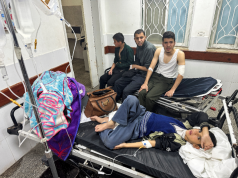
The House of Representatives passed the bill that would lower the age of criminal responsibility from 15 to 9 years old despite questions over scientific basis for the shift in policy.
Local and international child rights groups opposed the development.
Posted by UNICEF Philippines on Friday, January 18, 2019
SAD DAY FOR CHILDREN’S RIGHTS: Child Rights Network expresses anguish, disappointment on passage of bill lowering…
Posted by Child Rights Network (CRN) Philippines on Sunday, January 20, 2019
CICL are victims of state neglect and abandonment. Lowering the MACR will not resolve nor decrease the number of youthful offenders. Instead, the government should focus on responsive programs and policies to address poverty.#NOToLoweringMACR #ChildrenNotCriminals pic.twitter.com/Jb3bh9JRTC
— Salinlahi #NOtoLoweringMACR #ChildrenNotCriminals (@salinlahiphils) January 21, 2019
The unnumbered substitute bill, which Rep. Victor Yap of Tarlac proposed, seeks to amend the provision in the Juvenile Justice Law that currently sets the age of criminal responsibility of children at 15 years old and lower it to 9 years old.
What science says
The determination of discernment, according to the passed measure citing jurisprudence, is “the ability of a child to understand the moral and psychological components of criminal responsibility and the consequences of the wrongful act; and whether a child can be held responsible for essentially antisocial behavior.”
Scientific studies, however, showed that discernment on decisions and actions—which is apart from the ability to distinguish right and wrong—does not develop until adolescent years.
A previous position paper from the Philippine Pediatric Society explained that the prefrontal cortex of the brain or the part responsible for “executive decisions” such as decision-making starts to develop dramatically during adolescent years.
“A younger child, for example, would not be able to fully anticipate all the possible consequences of their actions for themselves and society as a whole. An older child of 16 years, is able to consider rules based on intention and outcome thus can make informed decisions especially when properly guided,” the group explained.
The group also emphasized that discernment “requires intellectual, emotional and psychological maturity.”
“This is a tall order for children who are still in the process of developing in all aspects, who still have limited life experiences and therefore limited worldview to learn and apply what they are taught,” the PPS said.
If a child grew up in a risky environment, the development of these abilities can be delayed.
“Progress toward completion of cognitive and moral developmental stages can be detoured or delayed by cultural, intellectual and social disadvantage. Children in conflict with the law typically have risk factors such as poverty, mental illness, drug and alcohol abuse, exposure to crime and violence, homelessness, child abuse and neglect,” it said.
Newer studies also revealed that a human brain’s full development or maturity reaches when a person is already 25 years old.
A neuroscientist named Sandra Aamodt explained in an interview that aside from the prefrontal cortex, another crucial part of the brain responsible for a person’s reward system is still developing between the ages of 18 and 25 years old.
This is why young adults tend to be more interested in “uncertain situations to seek out and try to find whether there might be a possibility of gaining something from those situations.”
Parental supervision, she says, also has an impact on a teenager’s activities.
“The risks of crime and car accidents and all the crazy things that adolescents do are actually more issues with young adults, people in the 18 to 25 age range, largely because they have more opportunities to get into these kinds of trouble because they have less parental supervision than the younger adolescents do,” Aamodt said.
The Child Rights International Network also explained that age is “arbitrary” in determining a person’s capacity to discern.
“Capacity is therefore not just an innate state; it depends on external circumstances which can encourage or inhibit a child’s autonomy,” it said.
What lawmakers think
For Malacañang, 9-year-old children are already capable of discernment due to the modern technology they use.
“For me, 9 is fine. Considering the modern technology, nine is like the equivalent of 12, 15 years old. They have discernment already,” Salvador Panelo, Palace spokesperson, said.
This is contrary to the recommended minimum age of the United Nations Convention on the Rights of Child or UNCRC, wherein the Philippines is one of the signatories.
The minimum of criminal responsibility or MACR should be at 12 years old and above, according to its provisions.
Senate President Vicente Sotto similarly filed Senate Bill 2026 that seeks to lower the MRAC to 13 years old.
Sotto cited a study from the CRIN for this measure, but the organization eventually countered it and described the lawmaker as “misguided.”
The UN had been calling out the country’s justice system since 2016 during the filing of House Bill 2, a previous proposal to lower MRAC to nine years. House Bill 2 was eventually merged with the new one.
These plans are backed by President Rodrigo Duterte who has since opposed the Juvenile Justice Law and perceived it as the cause of the rising crimes in the country.
Lawmakers have also cited this law as the reason why children are being used by drug syndicates as peddlers on the streets.









